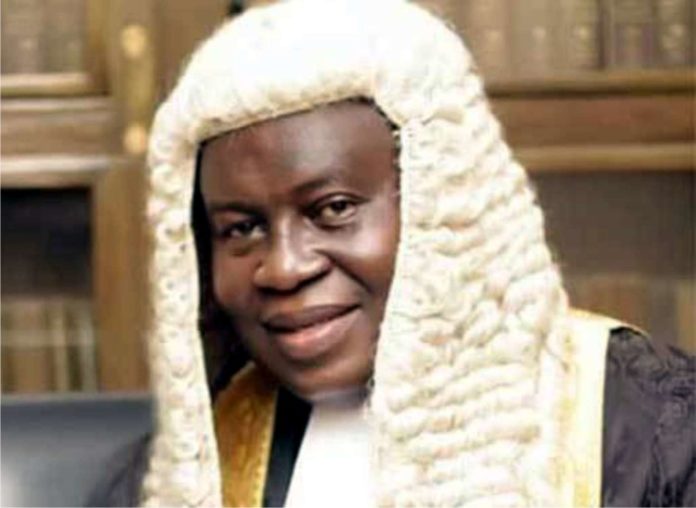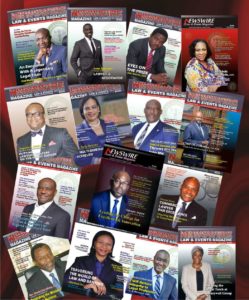
The Rule of Law Development Foundation
Economic Crimes, Fraud and Other White Collar Crimes in Nigeria
Lead Presentation By Arthur Obi-Okafor, SAN at the (Maiden Annual Criminal Law Review Conference) International Conference Centre, FCT, Abuja
21 – 22 November, 2018
Introduction
Economic crimes, fraud, and white-collar crimes have negative effects on the economic development of any nation where they thrive. In Nigeria however, from the boss to his messenger, the police officer, and the recruit, the teacher and his student, the politician and the voter, the judge and the lawyer, the pastor and his parishioner –none can be said to be untainted by the stigma of these crimes. This is based on the fact that Nigeria is one of the few countries in the world where white collar crimes are rewarding while ‘get rich quick’ ideology flourishes as a sudden source of wealth is never questioned either by the public or the government.
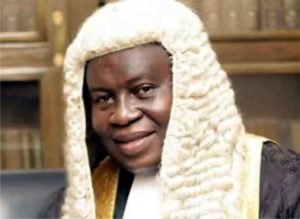
An examination of the Corruption Perception Index, 2017 of Transparency International (TI) revealed that the perception of corruption in Nigeria worsened between 2016 and 2017. Nigeria ranked 148 out of 180 countries assessed in 2017 on the perception of corruption. The index which was published on TI website shows that out of 100 points signalling maximum transparency and no corruption, Nigeria scored 27 points. The result shows a slight deterioration in the perception of corruption in public administration in Nigeria compared to 2016 where Nigeria scored 28 points and ranked 136th in the ranking of countries.
With the one-point reduction in the score, Nigeria slipped in the country-ranking by 12 positions, from 136 in 2016 to 148 in 2017, on a scale of 1 to 180, with 180 indicating the country having the worst perception of corruption. The report noted that while the rest of the world has improved in the perception of corruption, Nigeria slips further down as the fight against corruption stagnates. On the African continent, Corruption Perception Index (CPI) of Transparency International reveals that Nigeria ranks 32nd position in Africa out of 52 assessed countries in 2017, while Botswana leads the continent with the record of competent and largely corruption-free public administration. In West Africa, Nigeria is the second worst country out of 17 countries.
However, the factors responsible for this menace and the figures above may be attributed to abject poverty of the governed; the nature of Nigeria’s political economy; the weak institutions of government; absence of clear rules and codes of ethics in public services; culture of affluence; ostentatious living that puts pressure on public officials; and a dysfunctional judicial system.
For a proper grasp of the objective of this research, the paper has been divided into five sections. The section after the introduction will focus on the conceptualization of terms while incidences of economic crimes, fraud and white-collar crimes in Nigeria will be examined in section three, and section four will dwell on means of combating the menace and finally recommendations and conclusion in section five.
Conceptualization of terms
i. Economic Crime: Economic crime is defined under Section 40 of the EFCC Act as:
“‘Economic Crime’ means the non-violent criminal and illicit activity committed with the objectives of earning wealth illegally either individually or in a group or organised manner thereby violating existing legislation governing the economic activities of government and its administration and includes any form of fraud, narcotic drug trafficking, money laundering, embezzlement, bribery, looting and any form of corrupt malpractices, illegal arms deal, smuggling, human trafficking and child labour, oil bunkering and illegal mining, tax evasion, foreign exchange malpractices including counterfeiting of currency, theft of intellectual property and piracy, open market abuse, dumping of toxic wastes and prohibited goods, etc.’’
Economic crime covers a wide range of offences, judging from the definition above. Hence, it is generated from a hidden power that defines the relationships between economics and politics. Economic crime is regarded to generate a considerable social damage. That is because it does not only affect democratic institutions but also undermines economic development by cutting available resources meant for implementation of public projects. It is important to state that economic crimes are often carried out by powerful actors linked to political and economic power. Economic crime is usually confused with corruption which is just an aspect of economic crime.
ii. Fraud: Fraud, according to the Black’s Law Dictionary, is ‘a knowing misrepresentation of the truth or concealment of a material fact to induce another to act to his or her detriment’. The Supreme Court of Nigeria in the case of Otukpo v. John ‘defined fraud as ‘an intentional perversion of truth for the purposes of inducing another in reliance upon it to part with some valuable thing belonging to him or to surrender a legal right.’ It is perceived as an act of dishonesty and also morally wrong.
Further, Adewumi defined fraud as “… a conscious premeditated action of a person or group of persons with the intention of altering the truth and/or fact for selfish personal monetary gain”. The offence is criminalized under Section 419 of the Criminal Code law of Nigeria, Section 2 of the ICPC Act and Sections 1 and 2 of the Advanced Free Fraud Act of Nigeria. While corruption is seen as part of the economic crime, fraud is an aspect of corruption.
iii White Collar Crimes: the concept of white-collar crime was first identified by Edwin H Sutherland in 1940. He dealt with the problem as a violation of trust involving either or both misrepresentation and duplicity. Sutherland defined the concept as ‘the crime committed by a person of respectability and high social status in the course of his occupation”. Though there is a plethora of definitions and opinions on what constitute white collar crimes, this research will, however, examine a few.
According to the Black’s Law dictionary, white collar crimes may be defined as “a non-violent crime usually involving cheating or dishonesty in commercial matters.” The Oxford English Dictionary defines the white-collar criminal as “a person who takes advantage of the special knowledge or responsibility of his position to commit non-violent, often financial crimes.” While the American Dictionary of Criminal Justice more specifically defines white-collar crime as “nonviolent crime for financial gain committed by means of deception by persons whose occupational status is entrepreneurial, professional or semi-professional and utilizing their special occupational skills and opportunities.
White-collar crime is considered a special breed in the criminal justice system, as there is a long history of perceived leniency with regard to the perpetrators of this crime. It is most times viewed as the most dangerous, most intractable and most corrosive crime that exists in our society. Most dangerous because it is perpetrated by people who are in authority and classified as respectable members of society. The parameters of white collar crimes extend to all aspects of economic crimes such as fraud, misrepresentation and financial crimes.
Overview of Economic Crimes, Fraud and White Collar Crimes
The concepts of economic crime, fraud, and white-collar crimes have been explained above. However, it may be pertinent to examine recent incidences of these crimes which are known to be prevalent in Nigeria and are the reason Nigeria slipped into 148 position in the 2017 Corruption Perception Index of Transparency International (TI).
i. $24 billion NNPC contract scam.
The alleged $24 billion contract scam in the Nigerian National Petroleum Corporation (NNPC) shows the extent to which economic crime and white collar crimes flourish in Nigeria.
ii. Illegal recall and promotion of Mr. Abdulrasheed Maina.
Nigerians were shocked to learn that the ex-Police Pension Task Force boss and civil servant, Mr. Abdulrasheed Maina, has fraudulently been reinstated and subsequently promoted to the position of an Acting Director in the Federal Civil Service. Some senior civil servants were suspected to have plotted Maina’s resumption. However, none of these officials have been sacked, told to resign or punished for violating the Civil Service Rules.
iii. $43 million Ikoyi money.
In April 2017, the Economic and Financial Crimes Commission (EFCC) discovered $43 million, £27,000 and N23 million stashed away at a flat in Ikoyi after a tip-off from a whistle-blower. Following reports that the monies belonged to the NIA, it was reported that the Agency collected $289,202,382 in cash from the account of the National Petroleum Investment Management Services (NAPIMS) at CBN in February 2015 after the postponement of the general election. Through a court order, the money was forfeited to the Federal Government.
iv. The Joint Admission and Matriculation Board (JAMB) Fraud.
The surprise remittance of N7.8billion to the Federal Government by the Ishaq Oloyede- led management of the Joint Admission and Matriculation Board made the Federal Government, working on the suspicion that the previous management had defrauded the Federation of billions in unremitted revenues, order a forensic audit of the accounts of JAMB from 2010 to 2015. The report revealed that JAMB failed to remit revenues in excess of N8billion to the Federal Government between 2010 and 2015. The amount includes unremitted Value Added Tax, Withholding Tax and revenues realized from the sale of scratch cards. The staff involved in the scam have been arraigned in court.
v. Alleged privatization of Nigerian Police Force by the current IGP.
Nigeria’s Inspector General of Police was accused by Senator Isah Hamma Misau of embezzling police funds to the tune of N10billion monthly. The fund was said to be income from security services provided by the Force to private companies. It is saddening that the case was never investigated.
vi. The Grass-Cutting scandal of ex-Secretary to the Federal Government.
The grass cutting contract scam of the immediate past Secretary to the Government of the Federation, Babachir Lawal, was noted as legendary especially as it involved a contract of N200 Million (two hundred Million Naira) just to cut grass around the office of the Secretary to the Federal Government. This is because the contract sum was far above allocation for needed amenities to the OSGF. Though Babachir was sacked and is being investigated by the EFCC.
An examination of the incidences above shows that economic crimes, fraud, and white collar crimes are prevalent in Nigeria.
Effects of Economic Crimes, Fraud and White Collar Crimes on the Nigerian Economy.
Economic crimes, fraud, and white collar crimes are the major causes of financial loss, poverty, huge debt profile and economic crisis in Nigeria. These crimes have a negative impact on the economic well-being of society as they hinder development which includes reducing domestic investment, foreign direct investment, overblown government expenditure, distorted allocation of government expenditure away from education, health, and the maintenance of infrastructure. Economic crimes, fraud, and white collar crimes are the major cause of less-efficient and sub-standard public projects that provide more scope for manipulation and bribe-taking opportunities.
Further, economic crimes have distorted the image and reputation of Nigeria in the international community as Nigeria is viewed as one of the most corrupt nations of the world.
Combating the Menace of Economic Crimes, Fraud and Other White Collar Crimes in Nigeria.
According to Professor Deji Adekunle, incidental corruption is a feature of life in almost all societies, but it can be systemic in the public institutions of developing countries if not society as a whole. In various country case studies, a key source of corruption has been a self-serving political leadership and a large inefficient politically influenced and misdirected state framework within which individuals and group interests have priority over the collective good. Corruption thrives in states that permit considerable discretion and monopolist influence to be wielded by public officers and institutions .
Economic crimes, fraud, and white collar crimes are cankerworms eating deep into the nation’s finance. Though, the anti-corruption campaign of the President Mohammadu Buhari’s administration is laudable, more, however, needs to be done in order to eradicate this menace from our system. This section will examine the strategies on ground with the intent to identify other useful measures that will help in combating economic crimes in Nigeria.
Criminalization of Economic crime, fraud and white-collar crimes in Nigeria
Considering the international perception of Nigeria as one of the most corrupt Nations of the world and also an attempt to combat the menace, there exists a plethora of anti-graft laws which criminalize these crimes in Nigeria. These laws include: the Constitution of the Federal Republic of Nigeria 1999, The Economic and Financial Crimes Commission Act, the Independent Corrupt Practices and Other Related Offences Commission Act, the Advanced Fee Fraud and other Fraud Related Offences Act, the Penal Code, the Criminal Code, the Code of Conduct Bureau and Tribunal Act, the Money Laundering (Prohibition) Act, and the Administration of Criminal Justice Act.
It is saddening that despite the existence of these laws, Nigeria was still ranked as 148 in the Transparency International corruption perspective index of 2017.
Other Anti-corruption Strategies.
In this section, the paper will attempt to examine other strategies deployed by the current administration in the struggle to combat the menace of economic crimes and other related crimes in Nigeria.
i. Presidential Advisory Committee on Anti-Corruption(PACAC).
PACAC which was constituted in August 2015 is an initiative of the President Mohammad Buhari’s administration. The committee was the first committee set up by the present government as part of its effort to combat corruption and related offences in Nigeria. The mandate of the committee is to promote the reform agenda of the government on the anti-corruption effort, to advise the present administration in the prosecution of the war against corruption/related offences and implementation of required reforms in Nigeria’s criminal justice system. So far the committee is living up to that mandate.
ii. The Corruption and Financial Crimes Cases Trial Monitoring Committee (CONTRIMCO).
The Corruption and Financial Crimes Cases Trial Monitoring Committee (CONTRIMCO) was set up by the National Judicial Council (NJC) in 2017. The mandate of CONTRIMCO is to undertake periodic monitoring and evaluation of the performance of the judges of the special anti-corruption courts. The Committee which commenced work in early 2018 released its first interim report in July 2018. Though there are questions as to the existence of anti-corruption courts in Nigeria, the committee is committed to duty.
iii. Financial Independence of State Judiciaries
Judicial financial independence connotes that the Judiciary as an arm of the government should not unduly depend on other branch/branches of the government for its financial needs. The lack of financial independence at the state judiciaries largely resulted in the inability to curb the massive corruption, economic crimes and related offences for which many governors are standing trial and being jailed. With the constitutional amendment of section 121 (3) via the Fourth Alteration to the Constitution on financial autonomy of state judiciaries, the Judiciary will wake up to their constitutional responsibilities. The concept of checks and balances which has been more effective at the Federal level will also come into play at the State level and also help in combating the menace of economic crimes in Nigeria.
iv. Whistle Blowing Policy
The Whistle Blowing Policy was approved by the Federal Executive Council in December 2016. The policy was created by the Federal Ministry of Finance for whistle-blowers. The policy provides that if the government is able to recover stolen or concealed assets through information provided by a whistle-blower, he may be entitled to 2.5%-5.0% of the amount recovered.
v. Presidential Executive Order Number 6 (PEO No.6)
PEO No. 6 of 2018 sets out to address “the Preservation of Suspicious Assets Connected with Corruption and Other Related Offences.” PEO No.6 extends the scope of corruption to cover “other related offences”, including “terrorism, financing of terrorism, kidnapping, and sponsorship of ethnic or religious violence, economic sabotage, cases of economic and financial crimes”, and to a very nebulous category of “acts contributing to the economic adversity of the Federal Republic of Nigeria. Further, the Federal Government based on PEO no. 6 banned 50 persons from traveling abroad over corruption cases.
The primary responsibility for the prosecution of complex economic offences invariably rests on the prosecutorial mandate conferred by the statute creating the offence on an enforcement agency. Consequently there are in Nigeria several specialised prosecuting agencies concerned with bringing transgressors under various laws to justice. This poses a challenge of standards, arbitrariness and uniformity in the enforcement and application of criminal laws. However, the Constitution confers overarching supervision over public prosecutions on the Attorney-General. We believe that flowing from this it behoves the office of the Attorney-General to set clear parameters for the guidance of all prosecutors particularly in relation to the evaluation of cases and the exercise of discretion whether or not to prosecute. In our view, such guidelines should take account of the complexity or gravity of the case, utility or timeliness of prosecution, the availability of evidence, the impact of the crime on society, the nature of the crime itself and its impact on society, etc. It can also deal with procedures for handling politically sensitive cases in a manner consistent with the public interest. Clear guidance on prosecutorial policy will ensure cases are determined by known rules and that the prosecutor acts openly, fairly and in the interest of justice. The interest of justice in particular requires that a plea agreement reflects the seriousness and extent of the offence, gives the court adequate sentencing powers, and enables the court, the public and the victims to have confidence in the outcome. We have indeed commenced the process for this. It began with the publication in the official Gazette of the Economic and Financial Crimes Commission (Enforcement) Regulations, 2010 which was made to give effect to the Economic and Financial Crimes Commission Act, 2004. In highlighting the salient provisions, I wish to draw attention to 3 main areas which border on: investigations and prosecutions, plea bargaining and confiscated assets. The EFCC is required under the regulations to inform the Attorney General of the results of an investigations and whether a prosecution is intended where the case is of a complex nature. Let me reiterate that under the regulations, the EFCC is only required to inform and not to seek the consent of the Attorney General of the Federation before they commence prosecution. Since these agencies prosecute on behalf of the State, the Attorney General needs to be sensitive to the possibility of abuse of statutory mandate and arbitrariness.
Recommendations
While the paper applauds the strategies so far made by the president Mohammed Buhari led administration in the struggle to combat economic crime, fraud, and white collar crime in Nigeria, the paper via the recommendations below will suggest further areas that will help combat the menace in Nigeria.
i. Non-politicization of corruption, economic crime and fraud cases in Nigeria. Prosecution of all white collar offences is key in the fight against economic crime e.g. the prosecution and jailing of ex-Governors Dariye and Jolly Nyame of Plateau and Taraba respectively is laudable.
ii. Passage of Proceeds of Crime Bill into law.
iii. Synergy among the various anti-graft agencies .
iv. Continuous sensitization of both civil servants and the masses on the negative effects of economic crimes on the economy.
v. There is a need to improve the welfare of civil servants.
vi. Stiffer penalties in form of dismissal from service for civil and public servants found guilty of white collar crimes.
Conclusion
Economic crimes, fraud, and white collar crimes are cankerworms ravaging the Nigerian economy. These crimes are the major reasons Nigerians are currently living below the world poverty index and the major cause of economic crises in the country. Though there are several strategies already in place to combat these crimes, Nigeria is still perceived internationally as one of the most corrupt nations in the world, judging from the Transparency International Corruption Perception Index. A lot needs to be done to redeem the image of the country, salvage the economy and restore investors’ confidence in the country. The recommendations preferred above will go a long way in assisting the country in the struggle to combat economic crime, fraud, and white collar crimes
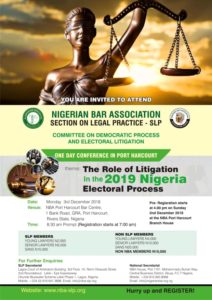
At Newswire, we present the world of law and the issues that engage them. This edition is yet again, ‘Mind-blowing’. Go get your copy(ies) Now!
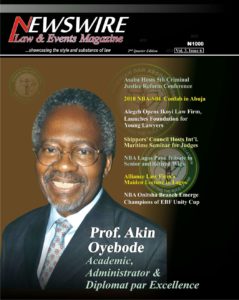
Do you need to be heard? Or your articles published? Send your views, messages, articles or press release to: newswiremagazine@yahoo.co.uk >>> We can cover your (LAW) events at the first Call: 08039218044, 08024004726
-Advertisement-
Grab our latest Magazine, "Chief Wole Olanipekun, CFR, SAN, A man of wide horizons and deep intentions". Get your order fast and stress free.
For more details about Newswire Law&Events Magazine, kindly reach out to us on 08039218044, 09070309355. Email: newswiremagazine@yahoo.co.uk. You will be glad you did


